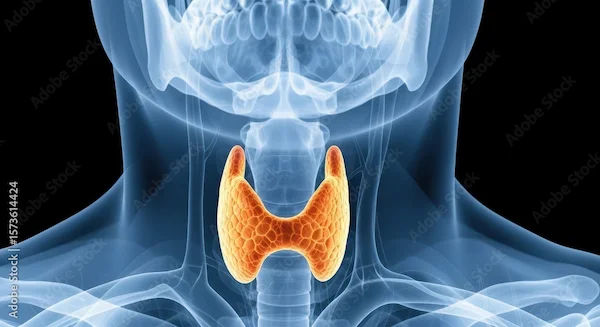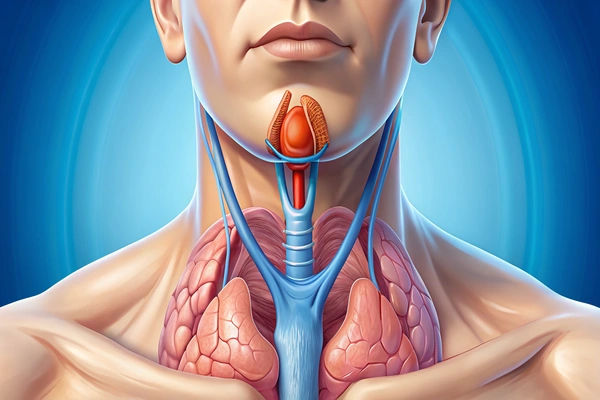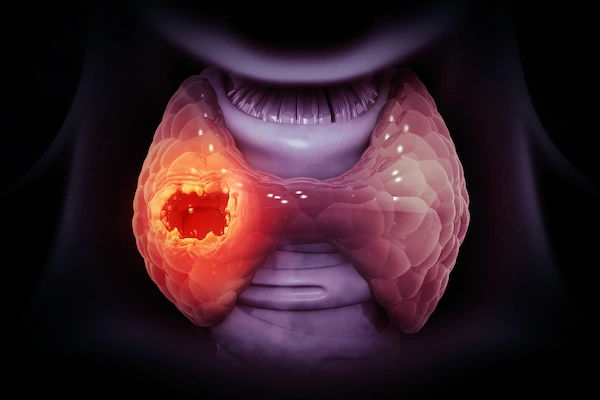Signs Of Thyroid Cancer
Learn about the common signs and symptoms of thyroid cancer. Early detection can be crucial for effective treatment. Explore the key indicators and when to seek medical advice.

Written by Dr. Dhankecha Mayank Dineshbhai
Reviewed by Dr. D Bhanu Prakash MBBS, AFIH, Advanced certificate in critical care medicine, Fellowship in critical care medicine
Last updated on 13th Jan, 2026
%20(1).webp?tr=q-80,f-webp,w-350,dpr-2,c-at_max 700w)
Introduction
Your thyroid, a small butterfly-shaped gland at the base of your neck, is the engine of your endocrine system, regulating metabolism, energy, and more. While incredibly vital, it's also susceptible to nodules and, in some cases, thyroid cancer. The good news is that thyroid cancer is often highly treatable, especially when caught early. But how do you know if a symptom is just a minor issue or a potential red flag? This guide will walk you through the key signs of thyroid cancer, from the most common—a lump in the neck—to less obvious symptoms like a hoarse voice that won't go away. Understanding these signals is your first step toward proactive health and peace of mind.
The Most Common Sign: The Neck Lump
The overwhelming majority of thyroid cancer cases are first detected by the patient or a doctor as a lump, or nodule, in the neck. It's crucial to understand that approximately 90-95% of thyroid nodules are benign (non-cancerous). However, discovering one warrants medical evaluation to rule out malignancy.
What Does a Thyroid Nodule Feel Like?
A thyroid nodule is typically felt just below the Adam's apple. It may move slightly when you swallow. Most are painless, which can ironically lead people to dismiss them. You might discover it while buttoning a shirt, applying moisturiser, or looking in the mirror. The key characteristic is its location; it's central and moves with the swallowing motion.
Benign vs. Malignant: Not Every Lump is Cancer
Most nodules are caused by an overgrowth of normal thyroid tissue, cysts, or inflammation (thyroiditis). Doctors use specific criteria to assess risk. Factors that make a nodule more suspicious include:
- Rapid growth: A lump that gets bigger over weeks or months.
- Firm or fixed feel: A nodule that feels hard and doesn't move easily.
- Associated symptoms: The presence of other symptoms of thyroid cancer like hoarseness or swollen lymph nodes.
Other Key Symptoms of Thyroid Cancer
While a lump is the headline sign, a tumour growing in the confined space of your neck can press on other structures, leading to other important early signs of thyroid cancer.
Voice Changes and Hoarseness
The thyroid gland sits directly on top of the windpipe (trachea), and nestled within it are the laryngeal nerves that control your vocal cords. A growing tumour can press on or invade these nerves, causing hoarseness or a voice change that persists for more than a few weeks without a clear cause like a cold. This is a significant red flag.
Difficulty Swallowing (Dysphagia)
As the oesophagus (food pipe) is also located behind the trachea and thyroid, a large nodule or tumour can physically impede the passage of food. You might feel a sensation of food getting "stuck" in your lower throat or experience discomfort when swallowing solid foods.
Consult Top Specialists
Neck and Throat Pain
Though most nodules are painless, some can cause a dull ache or even pain that can radiate up to the jaw or ears. This is less common but is another valid reason for investigation.
A Persistent Cough
If a tumour is irritating the trachea, it can trigger a persistent cough that isn't related to a respiratory illness, allergies, or acid reflux. This cough typically doesn't produce phlegm.
Swollen Lymph Nodes
Lymph nodes are part of your body's immune system. If cancer cells break away from the main tumour, they can travel to and enlarge the lymph nodes in the neck. Swollen nodes that don't resolve within a few weeks should always be checked by a doctor.
- Less Common but Important Signs
- Here are some less common but important signs:
- Respiratory Trouble: When Breathing Becomes Difficult
In advanced cases where a tumour grows significantly, it can compress the trachea, leading to shortness of breath or a feeling of breathing through a narrow straw, especially when lying down. This is a serious symptom requiring immediate medical attention.
Hormonal Symptoms (In Rare Cases)
The vast majority of thyroid cancers do not affect hormone production. However, medullary thyroid cancer (MTC), a rare type, can produce high levels of the hormone calcitonin. This can sometimes cause severe diarrhoea and flushing, which are unique symptoms of medullary thyroid cancer.
What Are the Risk Factors?
Understanding what increases your risk can help you and your doctor contextualise any symptoms.
- Genetic and Family History: A family history of thyroid cancer, particularly medullary thyroid cancer (MTC) or syndromes like Multiple Endocrine Neoplasia type 2 (MEN2), is a significant risk factor.
- Radiation Exposure: Exposure to high levels of radiation to the head and neck, especially during childhood (from old medical treatments or nuclear fallout), is a well-established risk factor for developing thyroid cancer.
- Certain Hereditary Syndromes: Familial adenomatous polyposis (FAP), Cowden syndrome, and Carney complex are among the genetic syndromes linked to an increased risk of papillary thyroid cancer.
When to See a Doctor?
If you experience any of the symptoms above, particularly a new lump in the neck, persistent hoarseness, or difficulty swallowing, it's time to consult a professional. If symptoms persist beyond two weeks, consult a doctor online with Apollo24|7 for further evaluation. They can perform a preliminary assessment and guide you on the next steps, which may include an in-person visit for a physical exam. Early consultation is always the best strategy.
How is Thyroid Cancer Diagnosed?
The diagnostic process is straightforward and designed to provide clarity.
The Initial Physical Exam: Your doctor will feel your neck to assess the size and firmness of the thyroid and check for any swollen lymph nodes.
Key Diagnostic Tests:
- Ultrasound Imaging: This is the first-line imaging test. It uses sound waves to create a picture of the nodule, revealing whether it's solid or fluid-filled (cystic) and identifying features like micro-calcifications that may suggest cancer.
- Fine-Needle Aspiration Biopsy (FNA): This is the gold standard for diagnosis. Under ultrasound guidance, a thin needle is used to extract cells from the nodule. A pathologist then examines these cells to determine if they are benign, suspicious, or malignant.
- Blood Tests: While no blood test can diagnose thyroid cancer, they provide crucial context. Tests for Thyroid-Stimulating Hormone (TSH) assess overall function. For MTC, a calcitonin test is vital. Apollo24|7 offers convenient home collection for tests like TSH and other thyroid panels, making initial screening easier.
Conclusion
Awareness of the signs of thyroid cancer is your most powerful tool. While the thought of cancer is daunting, remember that most neck lumps are harmless, and thyroid cancer itself is one of the most survivable cancers when addressed promptly. Don't ignore persistent symptoms like a hoarse voice or a new lump—these are your body's signals. Taking action by consulting a healthcare professional provides clarity, eases anxiety, and, if necessary, sets you on the fastest path to effective treatment. Your health is paramount; listening to your body and seeking expert advice is always the right choice. If your condition does not improve after trying these methods, book a physical visit to a doctor with Apollo24|7 for a comprehensive examination.
Consult Top Specialists
Consult Top Specialists

Dr. Anand Ravi
General Physician
2 Years • MBBS
Bengaluru
PRESTIGE SHANTHINIKETAN - SOCIETY CLINIC, Bengaluru

Dr. E Prabhakar Sastry
General Physician/ Internal Medicine Specialist
40 Years • MD(Internal Medicine)
Manikonda Jagir
Apollo Clinic, Manikonda, Manikonda Jagir
(150+ Patients)

Dr. Arunava Ghosh
General Physician/ Internal Medicine Specialist
10 Years • MBBS,MD(GENL.MED.),DM(ENDOCRINOLOGY)
Kolkata
VDC Clinic, Kolkata
Aditya Singh
Endocrinologist
8 Years • MBBS
Bengaluru
Apollo One Electronic City, Bengaluru

Dr. Chaithanya R
Internal Medicine Specialist Diabetologist
16 Years • MBBS, MD Internal Medicine, Fellowship in Diabetes(UK), CCEBDM(PHFI)
Bangalore
Apollo Clinic Bellandur, Bangalore
(75+ Patients)
Consult Top Specialists

Dr. Anand Ravi
General Physician
2 Years • MBBS
Bengaluru
PRESTIGE SHANTHINIKETAN - SOCIETY CLINIC, Bengaluru

Dr. E Prabhakar Sastry
General Physician/ Internal Medicine Specialist
40 Years • MD(Internal Medicine)
Manikonda Jagir
Apollo Clinic, Manikonda, Manikonda Jagir
(150+ Patients)

Dr. Arunava Ghosh
General Physician/ Internal Medicine Specialist
10 Years • MBBS,MD(GENL.MED.),DM(ENDOCRINOLOGY)
Kolkata
VDC Clinic, Kolkata
Aditya Singh
Endocrinologist
8 Years • MBBS
Bengaluru
Apollo One Electronic City, Bengaluru

Dr. Chaithanya R
Internal Medicine Specialist Diabetologist
16 Years • MBBS, MD Internal Medicine, Fellowship in Diabetes(UK), CCEBDM(PHFI)
Bangalore
Apollo Clinic Bellandur, Bangalore
(75+ Patients)
More articles from Thyroid Cancer
Frequently Asked Questions
What are the early signs of thyroid cancer in females?
While thyroid cancer is more common in women, the early signs are the same as for men: primarily a lump in the neck, followed by hoarseness, difficulty swallowing, and swollen lymph nodes. Hormonal factors may influence risk, but not the specific symptoms.
Can you have thyroid cancer without a lump?
Yes, it is possible but less common. Some cancers may be detected incidentally during an imaging scan for another reason. Symptoms like hoarseness or difficulty swallowing can sometimes occur without a easily palpable lump, especially if the tumor is located behind the windpipe.
Is thyroid cancer curable?
Yes, the overall prognosis for most types of thyroid cancer, particularly papillary and follicular, is excellent. The 5-year survival rate for localized thyroid cancer is nearly 100%. Early detection and treatment are key to achieving a cure.
Does thyroid cancer cause weight gain or fatigue?
Unlike an underactive thyroid (hypothyroidism), which commonly causes weight gain and fatigue, thyroid cancer itself typically does not directly cause these symptoms. The cancerous nodule usually does not disrupt the gland's hormone-producing function.
What does throat cancer feel like vs. thyroid cancer?
Throat cancer (e.g., laryngeal or pharyngeal) often presents with a sore throat, ear pain, and a change in voice that may be more pronounced. Thyroid cancer symptoms are more focused on a physical lump and compression symptoms (trouble swallowing, breathing). However, there is overlap (like hoarseness), so a doctor's evaluation is essential for a correct diagnosis.




